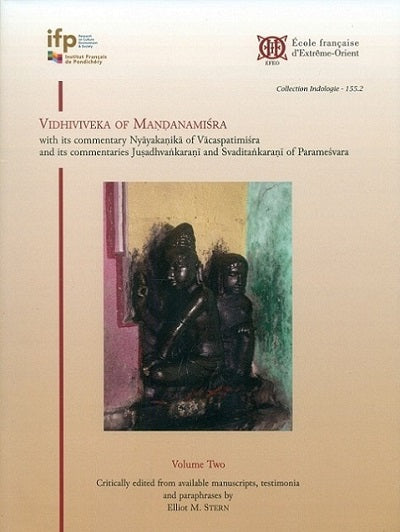Vidhiviveka of Mandanamisra, 2 vols. with its commentary Nyayakanika of Vacaspatimisra and its commentaries Jusadhvankarani Svaditankarani of Paramesvara, critically edited from ..
Vidhiviveka of Mandanamisra, 2 vols. with its commentary Nyayakanika of Vacaspatimisra and its commentaries Jusadhvankarani Svaditankarani of Paramesvara, critically edited from .. is backordered and will ship as soon as it is back in stock.
Couldn't load pickup availability
Genuine Products Guarantee
Genuine Products Guarantee
We guarantee 100% genuine products, and if proven otherwise, we will compensate you with 10 times the product's cost.
Delivery and Shipping
Delivery and Shipping
Products are generally ready for dispatch within 1 day and typically reach you in 3 to 5 days.
-
Publisher: ADITYA PRAKASHAN Indological Publishers & Booksellers
-
Language: Sanskrit, English
-
Edition: 2023
-
Binding: Hardbound
-
Is Set: Yes
-
Subject(s): Philosophy
-
ISBN 13: 9788184702477
-
ISBN 10: 8184702477
About the Book
This volume presents a critical edition of Mandana Misra's Vidhiviveka, one of the most influential treatises of Vedic Exegesis (Mimamsa) written by Mandana Misra (c. 660-720 CE). The work, comprising forty-two stanzas with an extensive auto-commentary, addresses theories of verbal injunction (vidhi) and presents Mandana’s view that verbal exhortation directs an agent towards achieving desired outcomes (istasadhana). The book includes the only known Sanskrit commentary, Nyayakanika, by the eminent 10th-century polymath Vacaspati Misra. Additionally, it features two unpublished commentaries on Vacaspati's work, Svaditankarani and Jusadhvankarani, by Paramesvara I, a 14th-century scholar from Kerala. Organized into two parts—aporetic and constructive—the volume explores different conceptions of injunction and the subsequent development of Mandana’s own theories. Detailed appendices provide insights into manuscript sources, quotations, and readings, making this work the most exhaustive examination of Brahmanical theory of action, commandment, and its roots in psychology, metaphysics, and religious philosophy.





